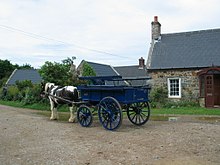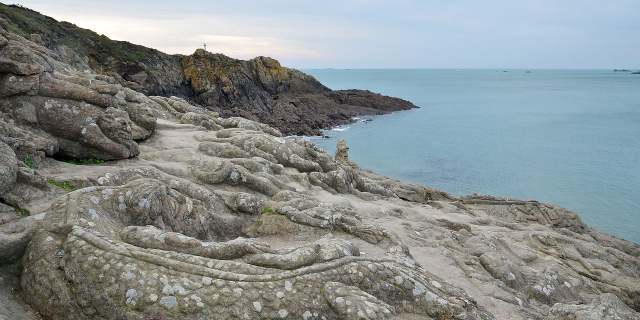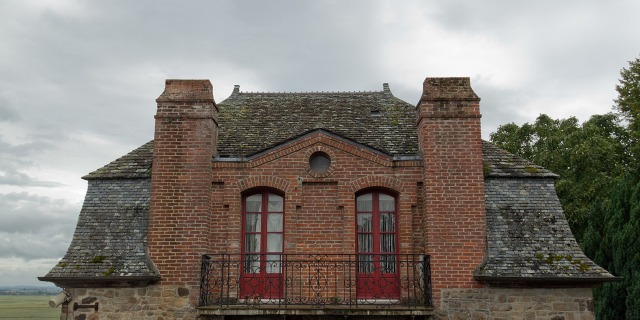Sercq
( Sark )
Sark (Sercquiais: Sèr or Cerq) is a part of the Channel Islands in the southwestern English Channel, off the coast of Normandy, France. It is a royal fief, which forms part of the Bailiwick of Guernsey, with its own set of laws based on Norman law and its own parliament. It has a population of about 500. Sark (including the nearby island of Brecqhou) has an area of 2.10 square miles (5.44 km2). Little Sark is a peninsula joined by a natural but high and very narrow isthmus to the rest of Sark Island.
Sark is one of the few remaining places in the world where cars are banned from roads and only tractors, bicycles and horse-drawn vehicles are allowed. In 2011, Sark was designated as a Dark Sky Community and the first Dark Sky Island in the world.
 A horse-drawn carriage on SarkEarly history
A horse-drawn carriage on SarkEarly history
In ancient times, Sark was almost certainly occupied by the Unelli, the Gallic tribe of the Cotentin Peninsula. These people were conquered by Julius Caesar of the Roman Empire about 56 BC in the Gallic Wars. About three decades later under Augustus, Gallia Celtica was subdivided into three parts, with this area a part of Gallia Lugdunensis, with its capital in Lugdunum, now Lyon. A later division was named Lugdunensis secunda (Lyonnaise 2nd). A Unelli town, now Coutances, was named Constantia in 298 by the Roman emperor Constantius Chlorus.
Around 430, the bishopric of Coutances (much later under the archbishopric of Rouen), was established in Coutances, having about the same limits as the Lyonnaise 2nd.
In 933, Sark was included in the Duchy of Normandy, based on the traditional boundaries of the Lugdunensis secunda and the archbishopric of Rouen. Following the Norman conquest of England in 1066, the island was united with the Crown of England. In the thirteenth century, the French pirate Eustace the Monk, having served King John, used Sark as a base of operations.
During the Middle Ages, the island was populated by monastic communities. By the 16th century, however, the island was uninhabited and used by pirates as a refuge and base. In 1565, Helier de Carteret, Seigneur of St. Ouen in Jersey, received letters patent from Queen Elizabeth I granting him Sark as a fief in perpetuity on condition that he kept the island free of pirates and occupied by at least forty men who were of her English subjects or swore allegiance to the Crown.[1] This he duly did, leasing 40 parcels of land (known as "Tenements") at a low rent to forty families, mostly from St Ouen, on condition that a house be built and maintained on each parcel and that "the Tenant" provide one man, armed with a musket, for the defence of the island. The 40 tenements survive to this day, albeit with minor boundary changes. (In 2015, the 450 year anniversary of this event was commemorated with the construction of a modern henge monument, Sark Henge.[2]) A subsequent attempt by the families to establish a constitution under a bailiff, as in Jersey, was stopped by the Guernsey authorities who resented any attempt to wrest Sark from their bailiwick.[citation needed]
Recent historyIn 1844, desperate for funds to continue the operation of the silver mine on the island, the incumbent Seigneur, Ernest le Pelley, obtained Crown permission to mortgage Sark's fief to local privateer John Allaire. After the company running the mine went bankrupt, le Pelley was unable to keep up the mortgage payments and, in 1849, his son Pierre Carey le Pelley, the new Seigneur, was forced to sell the fief to Marie Collings for a total of £1,383[3] (£6,000 less the sum borrowed and an accumulated interest of £616 and 13s).[4]
During World War II, the island, along with the other Channel Islands, was occupied by German forces between 1940 and 1945. German military rule on Sark began on 4 July 1940, the day after the Guernsey Kommandant Major Albrecht Lanz and his interpreter and chief of staff Major Maas visited the island to inform the Dame and Seigneur (Sibyl and Robert Hathaway) of the new regime. British Commandos raided the island several times. Operation Basalt, during the night of 3–4 October 1942, captured a prisoner, and Hardtack 7 was a failed British landing in December 1943. Sark was finally liberated on 10 May 1945, a full day after Guernsey.
In late August 1990, an unemployed French nuclear physicist named André Gardes, who believed he was the rightful holder of the Seigneur's title, attempted an invasion of Sark armed with a semi-automatic weapon. The night Gardes arrived, he put up two posters declaring his intention to take over the island the following day at noon. The following day he started a solo foot patrol in front of the manor, in battle-dress, weapon in hand. While Gardes was sitting on a bench waiting for noon to arrive, the island's volunteer connétable approached the Frenchman and complimented him on the quality of his weapon.[5] Gardes changed the gun's magazine to illustrate how it worked, allowing the constable to tackle and arrest him. He was given a seven-day sentence, which he served in Guernsey.[5][6][7][8] Gardes attempted this again the following year, but was recognized in Guernsey, arrested, and handed over to the French government.[citation needed]
Transition to new system of governmentBillionaire brothers David and Frederick Barclay had purchased an island within Sark's territorial waters in 1993[5] along with the hotels on the island.[9] In the mid-1990s, the brothers petitioned the European Court of Human Rights in Strasbourg, France, challenging Sark's inheritance law, which mandated their island be left to David's oldest son. The brothers wanted to will their estate equally to their four children.[10] In 1999, women in Sark were given equal rights of property inheritance, mainly due to the brothers' influence.[11]
Until 2008, Sark's parliament (Chief Pleas) was a single chamber consisting of 54 members, comprising the Seigneur, the Seneschal, 40 owners of the tenements and 12 elected deputies. A change to the system was advocated largely by the Barclay brothers.[9] Their premise was that a change was necessary to comply with the European Convention on Human Rights, though it was suggested that their objection was more likely at odds with certain property tax requirements and primogeniture laws affecting their holdings.[9][12] The old system was described as feudal and undemocratic because the tenants were entitled to sit in Chief Pleas as of right.[13]
On 16 January 2008 and 21 February 2008, the Chief Pleas approved a law to reform Chief Pleas as a 30-member chamber, with 28 members elected in island-wide elections, one hereditary member (the Seigneur) and one member (the Seneschal) appointed for life.[a][14] The Privy Council of the United Kingdom approved the Sark law reforms on 9 April 2008.[15] The first elections under the new law were held in December 2008 and the new chamber first convened in January 2009.[16][17]
Some Sark residents have complained that the new system is not democratic and have described the powers the new law granted to the Seneschal, an unelected member whose term the new law extended to the duration of his natural life, as imperial or dictatorial. The Court of Appeal had ruled his powers to be in breach of the European Convention on Human Rights[18] and his powers were subject to further legal challenges on these grounds.[19]
In 2012 the BBC Today programme reported on local disquiet about the influence on the island of the Barclay brothers.[20] The New Yorker magazine further illustrated the ongoing and escalating tensions between the Barclays and some of the longer-term residents.[21] In 2017 Private Eye also reported on the situation, following the Barclays' decision to close their vineyard and a number of hotels and shops they own on Sark.[22]
Dark Sky Community statusIn January 2011, the International Dark-Sky Association designated Sark as Europe's first Dark Sky Community[23] and the first Dark Sky Island in the world.[24] This designation recognises that Sark is sufficiently clear of light pollution to allow naked-eye astronomy. Although Sark was aided in its achievement by its location, its historic ban on cars and the fact that there is no public lighting, it was also necessary for local residents to make adjustments, such as re-siting lights, to cut the light pollution.
The designation was made in January 2011, following an audit by the IDA in 2010. The award is significant in that Sark is the first island community to have achieved this; other Dark-Sky Places have, up to now, been mainly uninhabited areas, and IDA chairman Martin Morgan-Taylor commended Sark residents for their effort.[25] After the designation was granted, Sark Astronomy Society worked to secure funds for an astronomical observatory on the island. In October 2015 Sark's observatory was officially opened by Marek Kukula, public astronomer from the Royal Observatory Greenwich.[26][27]
Cite error: There are <ref group=lower-alpha> tags or {{efn}} templates on this page, but the references will not show without a {{reflist|group=lower-alpha}} template or {{notelist}} template (see the help page).






























Add new comment